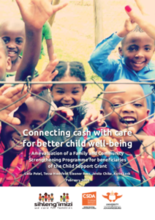This report presents the findings of an intervention study evaluating the short-term outcomes of Sihleng’imizi Family Programme, an evidence-based preventative social-educational intervention. The qualitative data was drawn from interviews with the 40 families who completed the programme and 20 control group families.
The outcomes of the programme were assessed in relation to changes that were evident in the five areas outlined below:
- Child-caregiver relations: improving communication, family cohesion, behavioural management, and caregiving capabilities;
- Involvement of caregivers in the child’s education;
- Social and community connectedness: improving social networks and social supports;
- Financial capabilities: enhancing basic budgeting and savings knowledge and skills, and
- Nutritional knowledge such as basic nutrition and hygiene in food preparation.
Overall, the Sihleng’imizi family strengthening intervention was found to be beneficial. It has the potential to scale up the positive effects of the CSG. Future social policy for families with children needs to move beyond the provision of cash transfers only and incorporate the concept of care in its widest sense. Complementary social interventions that combine cash transfers with a range of care services and strategies are needed to fast track improved social outcomes for children and families. Cash and care interventions that tackle the structural barriers that poor families with children face, could go a long way towards breaking the intergenerational cycle of poverty, inequality and social disadvantage in South Africa.

